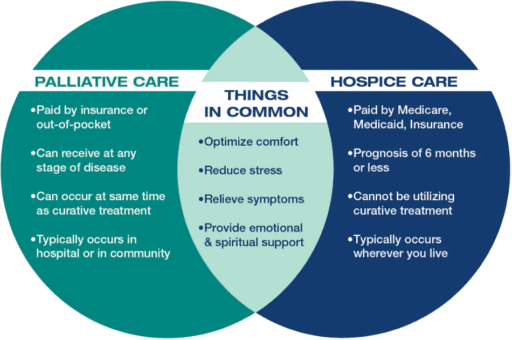When doctors mention palliative care or hospice care, families often feel confused and overwhelmed. These are two different types of care for different stages of illness. Understanding the difference helps you make the best choices for your loved one’s comfort and your family’s peace of mind.

What Is Palliative Care?
Palliative care is for anyone living with a serious chronic illness—even if they are not dying. It focuses on improving quality of life by managing pain, symptoms, and stress while you continue treatment for your condition.
You can receive palliative care:
- At any stage of chronic illness
- While still getting treatment to fight the disease
- Alongside care from your regular doctors
- For months or years, as your condition changes
Common conditions that benefit from palliative care include heart disease, kidney disease, COPD, diabetes complications, cancer during treatment, and rare diseases that cause ongoing symptoms.
What Is Hospice Care?
Hospice care is for people who are dying with a life expectancy of six months or less. This care focuses entirely on comfort, dignity, and quality of life rather than trying to cure the illness.
Hospice care means:
- Stopping treatments that are no longer helping
- Focusing entirely on comfort and symptom management
- Supporting the whole family through the dying process
- Providing care usually in your own home
The goal changes from fighting the illness to making sure your loved one is as comfortable and peaceful as possible during their remaining time.
How We Can Help You Understand Your Options
We don’t make these critical decisions for you—that’s your choice as a family. Instead, we help you understand your options clearly so you can make decisions that feel right for your loved one.
We provide independent guidance to help you:
- Understand the differences between palliative and hospice care
- Learn what each option means for your specific situation
- Feel confident about the path you choose
- Connect with the right care teams and resources
Why Learning About These Options Matters
The most significant benefit of understanding palliative and hospice care is knowing your choices before you’re forced to make quick decisions during a crisis. When you understand these options ahead of time, you can make thoughtful choices that truly reflect what’s best for your loved one and your family.
Many families tell us they wish they had known about palliative care sooner—it could have helped manage symptoms and improved quality of life months or even years earlier. Others say understanding when hospice becomes appropriate helped them shift from fighting the illness to focusing on comfort and precious time together.
You Don’t Have to Face This Alone
These decisions feel overwhelming because they matter so much. Having someone with experience explain your options in simple terms can bring tremendous peace of mind. You’ll feel more prepared, less scared, and confident that you’re making choices that honor your loved one’s wishes and values.
We offer sliding scale fees so families can get the support they need, no matter their budget. See our pricing options here.
Ready to Talk?
Schedule a free conversation with Nurse Peter to learn how we can support you and your family during this difficult time.
You don’t have to walk this path alone. We’re here to help.
